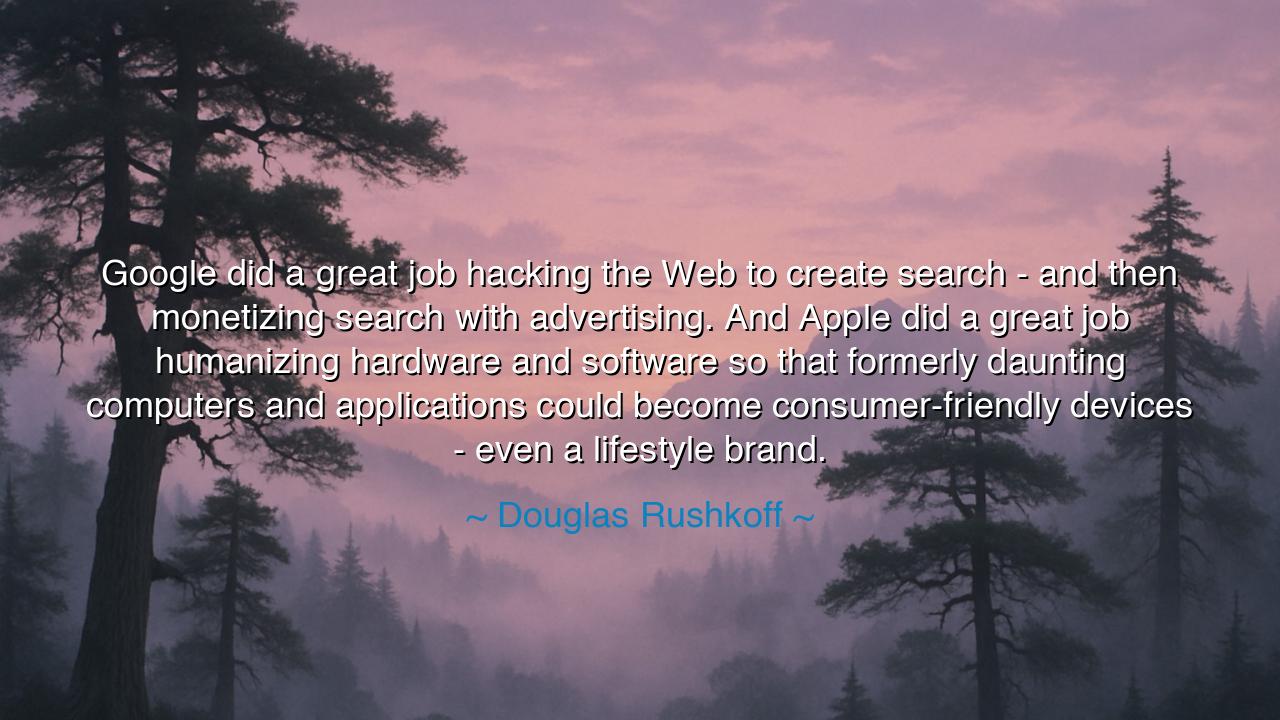
Google did a great job hacking the Web to create search - and
Google did a great job hacking the Web to create search - and then monetizing search with advertising. And Apple did a great job humanizing hardware and software so that formerly daunting computers and applications could become consumer-friendly devices - even a lifestyle brand.






“Google did a great job hacking the Web to create search — and then monetizing search with advertising. And Apple did a great job humanizing hardware and software so that formerly daunting computers and applications could become consumer-friendly devices — even a lifestyle brand.” — Douglas Rushkoff
Hear, O listener, the words of Douglas Rushkoff, chronicler of the digital age, who speaks of the twin titans of modern innovation — Google and Apple — and the distinct miracles they wrought upon the world. In this saying lies not mere praise, but a revelation about the nature of technology, humanity, and the alchemy that binds them. He tells us that one company mastered the invisible — the Web, the boundless sea of data — while the other mastered the tangible — hardware and software, the tools by which we touch the digital world. Between them, they reshaped not only our machines, but our very way of seeing, speaking, and living.
When Rushkoff says that Google “hacked the Web,” he speaks of an act both technical and spiritual — the unlocking of a hidden order beneath the chaos of information. Before Google, the Internet was a wilderness of scattered pages and forgotten links, a labyrinth without map or compass. But through the craft of search, Google became the lantern-bearer, illuminating pathways through darkness, allowing knowledge to be summoned with a single word. This was not mere convenience — it was the awakening of the world’s memory. Yet Google, in its genius, did not stop there. It turned this gift of clarity into commerce, weaving advertising into the fabric of discovery itself. Thus, it made knowledge free to the seeker — but paid for by the gaze of the many.
Then came Apple, the artist among engineers. While Google mastered the mind, Apple sought to win the heart. Its triumph was not in complexity, but in humanizing technology — softening its edges, making it beautiful, approachable, even desirable. Where once computers were the domain of specialists and scholars, Apple made them companions of the common man. The Macintosh, the iPod, the iPhone — each was more than a machine; each was a symbol of identity, of belonging to a tribe of dreamers. In Rushkoff’s words, Apple transformed hardware and software into something deeper: a lifestyle brand, where technology ceased to be a tool and became a mirror of the self.
Consider the tale of Steve Jobs, Apple’s visionary founder. He was no mere technologist — he was a philosopher of design. He believed that beauty was not a luxury, but a necessity; that simplicity was not emptiness, but truth. When he unveiled the first iPhone in 2007, he did not speak of processors or memory, but of what it could mean: a device that united phone, music, and Internet into one elegant form. The crowd stood in awe, not of numbers, but of harmony — the blending of function and feeling. Jobs, like a sculptor of light, revealed that technology need not alienate us; it could connect us more deeply to life, to creativity, to one another.
Meanwhile, Google’s founders, Larry Page and Sergey Brin, walked another path — the path of information. They sought not beauty, but order; not emotion, but insight. Their creation became the mind of humanity externalized, organizing the world’s data so that knowledge might serve the curious and the clever alike. Yet even in their cold precision was a kind of grace. For they, too, expanded human possibility — allowing every question, every wonder, every fragment of curiosity to find its answer. Through advertising, they found a way to sustain this gift, though it came at the price of intimacy. The seeker was free to search, but the searcher, in turn, became the searched.
From these two great forces — the thinkers of Google and the dreamers of Apple — a new age was born. One built the invisible architecture of understanding; the other built the visible vessels that made it humane. One taught us how to find; the other taught us how to feel. Rushkoff’s words remind us that technology is not monolithic — it is a reflection of human duality: the rational and the emotional, the analytic and the artistic, the structured and the soulful. Together, they represent the union of intellect and intuition, the marriage of machine and man.
Let this be the lesson, O listener of wisdom: true progress is not born of invention alone, but of balance. To master the digital realm, one must learn from both giants. From Google, learn to seek truth with rigor — to make knowledge accessible, ordered, and useful. From Apple, learn to honor beauty, empathy, and design — to make creation not just functional, but meaningful. Whether you build, write, or dream, remember this: technology without humanity is cold, and humanity without technology is blind. Only when the two move in harmony shall the future be worthy of its promise.
Therefore, walk forward as both creator and caretaker. Build as Google built — with intelligence and reach. Craft as Apple crafted — with heart and humility. And remember always the deeper wisdom of Douglas Rushkoff: that the destiny of technology is not in the machine, but in the soul that wields it. For when the mind seeks truth and the heart seeks beauty, the world itself becomes renewed — both searchable and sacred.






AAdministratorAdministrator
Welcome, honored guests. Please leave a comment, we will respond soon